When building modern data platforms, choosing the right database engine is critical.

ClickHouse is sometimes chosen for analytical workloads, but the absence of ACID compliance introduces significant limitations — particularly for use cases that demand consistency, reliability and transactional integrity.
On the other hand, SingleStore offers a unified architecture that supports both OLAP and OLTP workloads, bringing speed without sacrificing integrity. In this blog, we’ll dive into the core limitations of ClickHouse and explore why SingleStore is a smarter, future-ready alternative for real-time applications.
Understanding SingleStore vs. Clickhouse
SingleStore is a real-time analytics and AI database. With familiar SQL tooling and MySQL wire protocol compatibility, SingleStore eliminates the need for specialized databases and simplifies database architectures.
SingleStore is also built to handle multiple data types — including JSON, time-series, geospatial and full-text search— delivering high-speed data ingestion on a unified transactional (OLTP) and analytical (OLAP) foundation.
.png?width=1024&disable=upscale&auto=webp)
What is ClickHouse?
ClickHouse, developed by Yandex and maintained by ClickHouse, Inc., is a real-time data warehouse and open-source database that uses a highly performant columnar database built primarily for analytics. It is known for its exceptionally fast query performance on large datasets. ClickHouse leverages vertical partitioning, vectorized query execution and advanced compression techniques, making it a go-to solution for log analytics, observability and time-series workloads.
Key differences between SingleStore and ClickHouse
Aspect | SingleStore | ClickHouse |
Primary focus | Converged (OLTP + OLAP) workloads | High-performance analytical (OLAP) workloads |
Storage model | Universal columnstore for both OLTP and OLAP | Columnar storage optimized for analytical queries |
Query execution engine | Distributed SQL engine with compute pushdown | MPP engine with vectorized execution and compression |
Transaction | SingleStore supports full ACID transactions | Does not fully support ACID transactions |
Data ingestion | Real-time ingestion with inbuilt pipeline support for multiple sources like Kafka, S3, Iceberg format, JSON | High ingestion rates, typically with batch inserts |
Data updates | Supports standard SQL DML (INSERT, UPDATE, DELETE) for transactions | Limited support; best for append-only or batch updates |
Workload flexibility | Handles mixed workloads (operational + analytical) in one system | Primarily optimized for analytical, read-heavy workloads |
Scalability | Both horizontal and vertical online scaling | Horizontal scaling by adding more nodes; excels at massive scale analytics |
Compression | High compression ratio (60-70%) | Support compression |
Sharding | Automatic | Manual |
Data transformation | Inbuilt support of TRANSFORM using pipelines | No built-in syntax or feature |
Use case fit | Real-time analytics, mixed workload consolidation, simplifying data infrastructure | Analytical queries |
Vector datatypes | Mature | New |
JSON support | Fully integrated JSON data type and functions | Object data type and related functions to handle JSON data |
CDC out | Inbuilt CDC out feature | Not inbuilt |
WASM | Allows you to create UDFs/TVFs in a language of your choice and run them in a sandboxed environment for enhanced security | No support |
How to setup SingleStore and ClickHouse
SingleStore
- On-premises. Please follow the instructions here to download and install SingleStore
- Cloud: Start free. Spin up your cluster on the cloud of your choice (AWS/GCP/Azure) using the link here
ClickHouse
- On-premises. Follow the instructions in the link to download and install ClickHouse. link here
SingleStore and ClickHouse Configuration
ClickHouse
- Installation type: Cloud (region: Ohio)
- ClickHouse server version: 24.8
- Size: Scale up to 48 vCPU, 192 GiB (From 6 vCPU, 24 GiB)
- Engine: MergeTree
SingleStore
- Installation type: Cloud (region: Ohio)
- SingleStore version: 8.7.1
- Size: S-1, 8vCPU , 64 GiBPartition: 32
- Table type: Columnstore
ACID for transaction reliability
ACID guarantees are vital for any data platform — whether OLTP or OLAP — because they ensure reliable, consistent transactions, support concurrent data access without conflicts and protect against data loss after crashes. While ClickHouse delivers high-speed analytical queries, it does not implement full ACID transactions for row-level updates.
In contrast, SingleStore provides strong ACID compliance and outperforms other databases under mixed read/write analytical workloads, making it a superior choice for modern, high-concurrency use cases. This is why we’ve seen many teams choose to move away from partial solutions like ClickHouse and adopt SingleStore for its best-in-class performance and fully transactional integrity.
Let’s put both databases through the ACID test to provide a clear, evidence-based comparison.
SingleStore
.png?width=1024&disable=upscale&auto=webp)
Clickhouse
.png?width=1024&disable=upscale&auto=webp)
ACID test parameters
Atomicity
Atomicity is important because it ensures that a transaction is all or nothing — either all operations succeed, or none do — preventing partial changes that could corrupt data. We’ll do a simple fund transfer from Alice to Bob, intentionally triggering an error partway through so the entire transaction rolls back. You can see clearly that SingleStore passed this test, but this is not supported in ClickHouse Cloud or Self Managed.
Atomicity on SingleStore
.png?width=1024&disable=upscale&auto=webp)
.png?width=1024&disable=upscale&auto=webp)
Atomicity on ClickHouse
.png?width=1024&disable=upscale&auto=webp)
.png?width=1024&disable=upscale&auto=webp)
Consistency
Consistency ensures any transaction brings the database from one valid state to another, respecting constraints. You can clearly see that SingleStore constraints prevent invalid data from committing, where ClickHouse does not support transactions, unique key constraints and check constraints are also unenforced.
Consistency on SingleStore
.png?width=1024&disable=upscale&auto=webp)
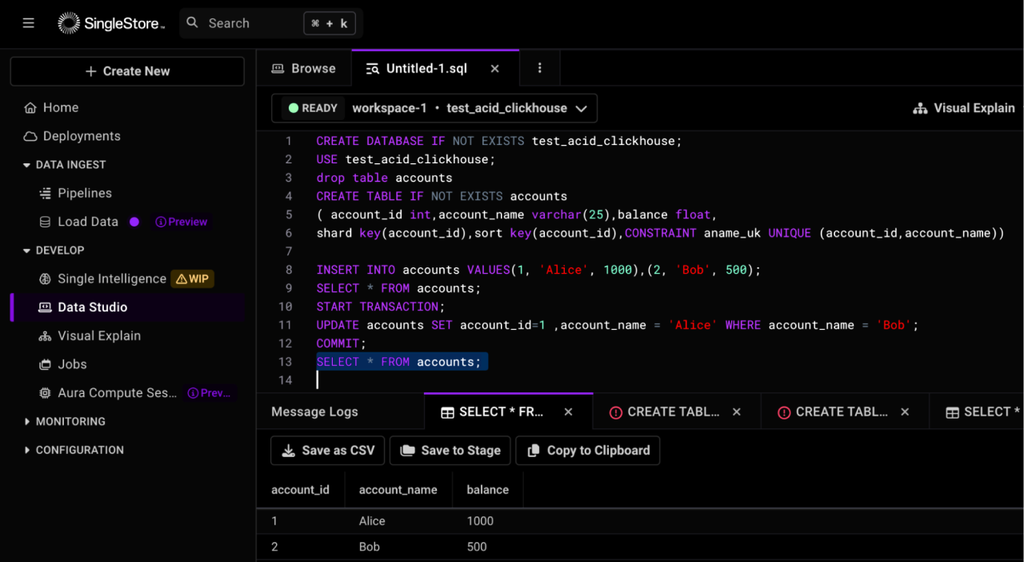
Consistency on ClickHouse
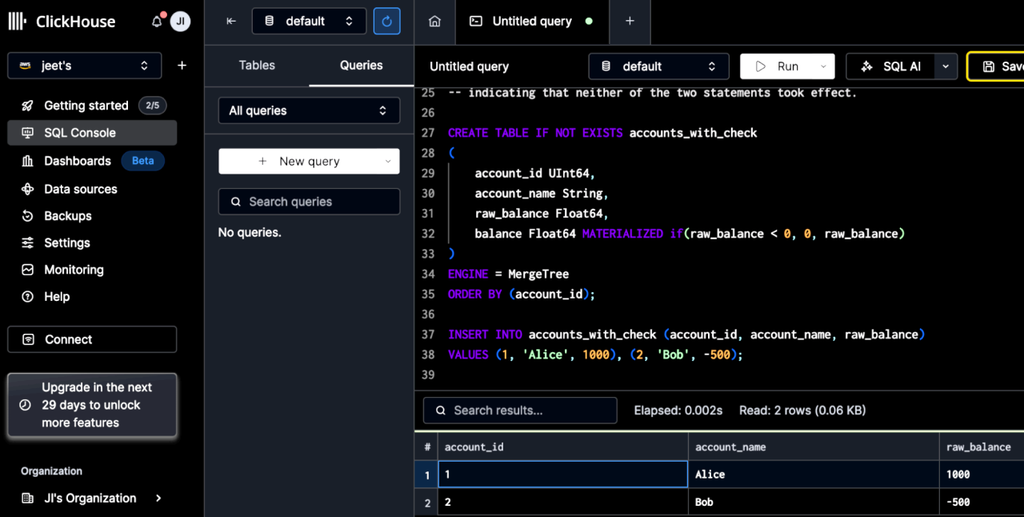
Isolation
Isolation ensures concurrent transactions do not interfere with each other’s intermediate states. A classic test is to open two separate sessions (transaction A and transaction B) and see if uncommitted changes in transaction A are visible (or blocked) in transaction B under different isolation levels.
Isolation on SingleStore

.png?width=1024&disable=upscale&auto=webp)
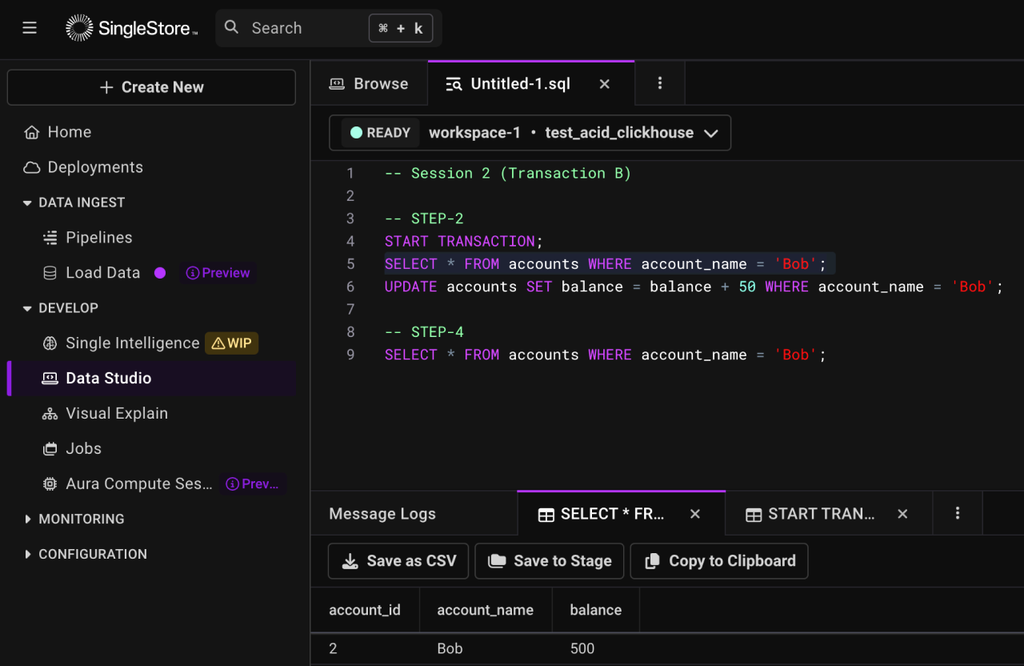
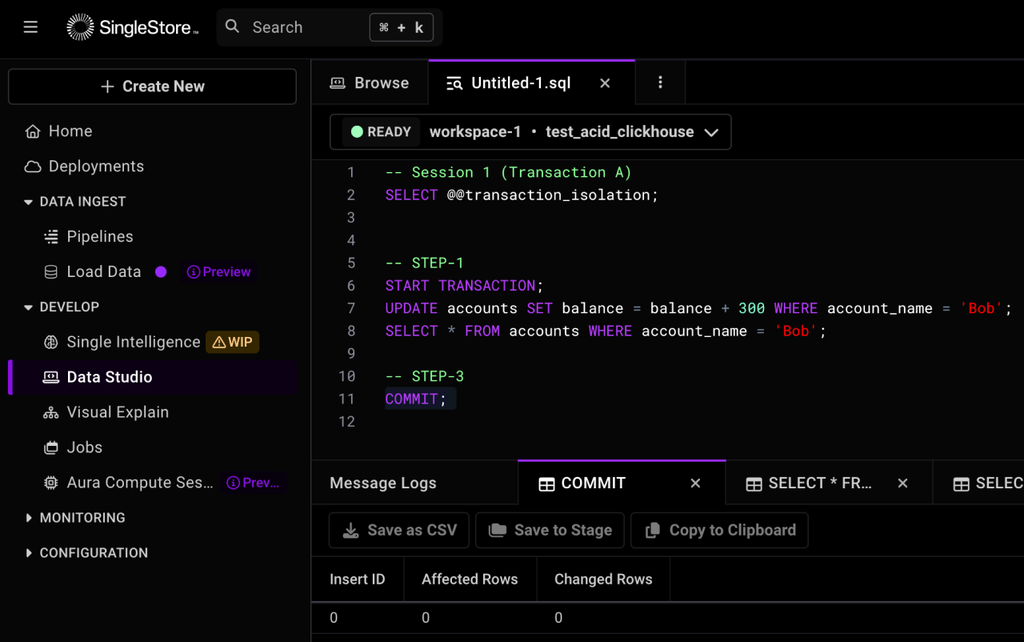
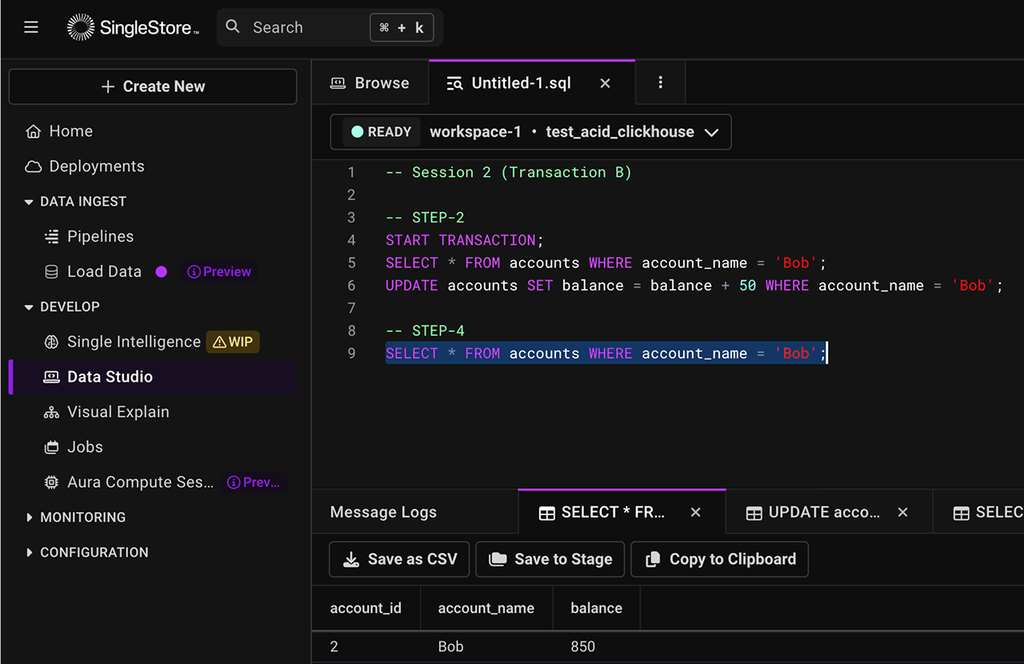
Isolation on ClickHouse
Isolation in ClickHouse is limited because it does not support row-level locks in the way an OLTP database does. We cannot do concurrent multi-statement transactions that remain uncommitted and invisible to other sessions.
ClickHouse does not provide the typical “dirty read/non-repeatable read/phantom read” isolation-level tests because it applies a simpler model: once the data is inserted, it is committed and visible.

Durability
Durability guarantees that once a transaction is committed, it will remain so (even if the system crashes or restarts).
Durability on SingleStore
SingleStore maintains a transaction log that is periodically persisted to disk. Durability depends on the underlying configuration of “sync durability” or “async durability.”
We can use the “sync” setting (synchronous durability) for fully durable commits, which flush the transaction log before acknowledging a commit. SingleStore supports multi statement durability under transaction.
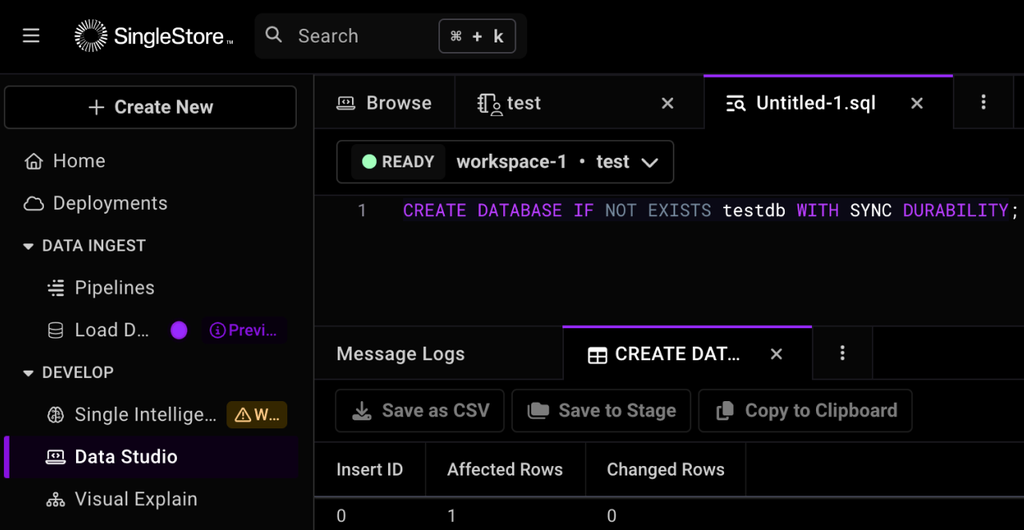
Durability on ClickHouse
ClickHouse provides single-statement durability guarantees.
ACID is fundamentally about transactional guarantees, so a database like ClickHouse that does not expose any notion of transactions (with commits and rollbacks) is generally not considered ACID compliant.
If a database like ClickHouse supports these single-statement atomic operations while ensuring consistency, isolation and durability for those operations, then strictly speaking,it can be described as ACID for single-statement transactions. But it is uncommon to call a database like this a “fully ACID-compliant system.”
After the above evaluation and the importance of strong transactional guarantees, I have identified a key limitation with ClickHouse:it is not a fully ACID-compliant database. While ClickHouse offers good performance for analytical workloads, it lacks support for full transactional features like multi-statement transactions, rollback and strict consistency guarantees.
To better align with your need for strong data integrity, consistency and operational flexibility, you should shift to SingleStore, a real-time analytics database that fully supports ACID compliance. SingleStore combines high-performance analytics with full transactional support, ensuring reliable data consistency and atomicity across complex workloads.
Frequently Asked Questions










